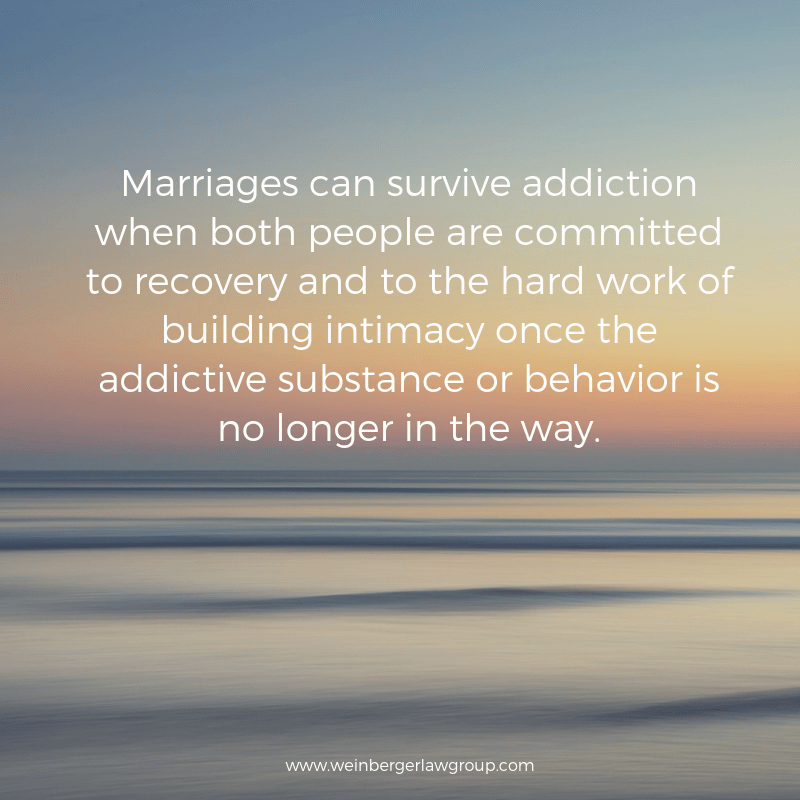Married To An Addict: Is Divorce Inevitable?

Almost 50% of marriages involving substance abuse end in divorce. Can your relationship can survive the impact of your spouse’s addiction? Before you call it quits, learn steps that can help you reclaim your marriage and rebuild the love and trust that addiction destroyed.
Step 1: Your spouse commits to a 12-step program. Recovering from addiction requires rigorous honesty and adhering to principles for leading a healthy life. Simply abstaining from use won’t change faulty beliefs and dysfunctional behaviors that fueled the addiction to begin with. There’s a saying in A.A. that the program “works if you work it.” While sobriety is by no means guaranteed – and relapse is part of recovery – addicts who attend regular 12-step meetings, get a sponsor, and work the steps are demonstrating that they’re serious about staying sober.
Step 2: You go to a 12-step program for partners of addicts. Partners of addicts tend to think and behave similarly. They organize their lives around controlling the addict until their own lives have become unmanageable. They often don’t become happier when the addict gets sober (from drugs, alcohol, gambling, sex), because they still have the same faulty core beliefs and compulsive, extreme behaviors.
Alanon, a 12-step program designed for anyone who loves an addict, will help you shift your attention from what you can’t control – your spouse and his or her substance abuse – to the only thing you can control – your own choices. Attending Alanon (or other programs for partners such as S-Anon, for partners of sex addicts) and working the 12 steps will help you learn to make your life manageable, whether or not your spouse remains in active addiction.
Step 3: You establish clear boundaries and expectations. If your spouse is an addict, you’re probably used to broken promises, manipulation, and gaslighting (denying your reality by lying and distorting facts). You probably try to control your spouse by threats, picking up his slack, and modulating your own behavior in an attempt to keep him from using or acting out.
The only way out of this chaos is to set clear boundaries and expectations. Tell your spouse what you will and won’t do; for instance, you will listen to his concerns, but you won’tcontinue a conversation in which you’re blamed for his using. If you promise you’re going to do something – say, leave the marriage after a year if the addict hasn’t gotten treatment — you must be prepared to follow through. Otherwise, your spouse has no incentive to change his behavior because he knows you will tolerate whatever drama he doles out.
Step 4: Your spouse seeks mental health/rehab treatment. You know your spouse is serious about changing when he stops blaming other people for using, and starts taking accountability for his choices. Most addicts need mental health intervention in addition to 12-step programs in order to get and stay sober. Depending on the severity and impact of his addiction, weekly outpatient therapy may not be enough. Your spouse may need intensive outpatient or inpatient treatment to detox and stabilize. Most rehabs offer family therapy because they know addiction affects the entire family, and that everyone needs to change to increase the chances of a successful recovery – from both addiction and codependence.
Step 5: Your life feels manageable. You’ll know you and your spouse are both in recovery from addiction when daily life feels more manageable. You are no longer driven by fear, despair, and frantic efforts to control your spouse’s addiction. You are able to set and maintain boundaries. You substitute composure for the yelling, tears, and angry silence. You feel periods of calm and contentment – even if your spouse is struggling. You sweep your side of the street (you take responsibility for your own behavior) and let your spouse sweep his – without telling him how!
Although you may wonder why you need help if your spouse is the one with the problem, it’s important to commit to your own personal growth. Even if your spouse doesn’t get sober, and you decide to divorce, you will have acquired tools to lead a more balanced life that doesn’t hinge on managing another person’s chaotic behavior.
Marriages do survive addiction when both people are committed to recovery and to the hard work of building intimacy once the addictive substance or behavior is no longer in the way.
We understand that you may have questions about the legal side of addiction, infidelity, marriage, and understanding your options should you decide to divorce. Our caring, compassionate family law attorneys are here to provide confidential, nonjudgmental help. Please today at 888-888-0919 to schedule your initial confidential consultation, or click the button below.
Schedule an initial Consultation
Read More:
Is Your Cheating Spouse a Sex Addict?
“You’ll Never See Your Child Again!” Investigating Addiction In Custody Disputes
Parenting Time After Addiction Recovery



